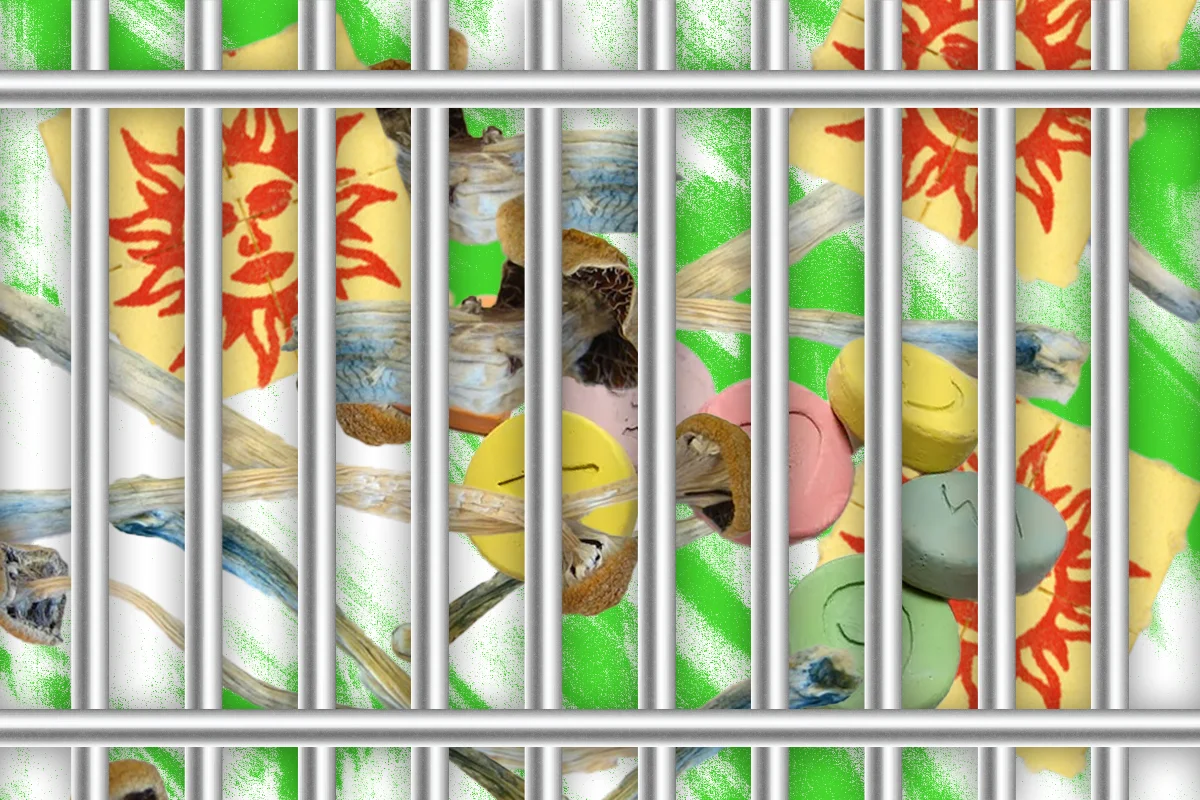In November 2020, Oregon made history by decriminalizing the possession of all drugs via Measure 110. Upon its introduction, the new measure garnered praise from experts as a significant stride in dismantling the war on drugs and preventing users from incarceration. Everything seemed gravy! That is, until it wasn’t.
Flashforward three-and-a-half years and Oregon is now repealing Measure 110 and replacing it with a new bill that will reinstate (lighter) criminal penalties for personal drug possession. Although the goal of the bill is to combat the proliferation of lethal substances such as fentanyl, the legislation would also prohibit the possession of psychedelics like LSD, MDMA, DMT, or psilocybin—substances unrelated to the ongoing overdose crisis or the issue of public drug use, according to Vox.
Now, individuals caught with even small amounts of drugs could potentially face up to 180 days in jail, according to the New York Times, effectively halting a unique and bold initiative aimed at diverting drug users away from imprisonment.
READ: People From Around the US Flock to Oregon for Legal Psilocybin Therapy Treatments
The decision to lump all drugs together without differentiation is bound to create major issues for consumers of psychedelics. Advocates argue that under this new law, expensive clinics and tightly controlled environments will be the only legal point of access to psychedelics. While regulated and supervised psychedelic therapy models demonstrate increasing efficacy in treating mental health issues, decriminalization opens the door to a broader range of use—some of which have existed for centuries—all are equally deserving of legal recognition.
“The biggest threat to psychedelics is from people who would claim to be for them in extremely limited contexts and against them in all others,” said Jon Dennis, a lawyer specializing in psychedelics at Sagebrush Law in Ontario, Oregon, to Vox.
It would make more sense if there were debates against the decriminalization of psychedelics. But that’s not what’s happening. Instead, the oversight of grouping psychedelics with opioids appears to have gone largely unnoticed, inadvertently hindering the personal use of psychedelics due to Oregon’s opioid crisis.
How to Grow Shrooms Bundle
Take Both of Our Courses and Save $90!
So, how did the Oregon experiment become such a disaster?
Almost all of the reporting on this issue points to glaring mistakes made in the execution of implementing the measure, which likely contributed to unintended consequences, such as public drug use. (More on that in a sec.) But, there were other societal issues that led to a surge in the number of people without housing, a demographic statistically prone to substance abuse. The population of unhoused individuals in Portland spiked by 65 percent from 2015 to 2023, the New York Times reports.
“I was cautiously optimistic [of Measure 110],” Ted Wheeler, Portland’s mayor, told the New York Times. Overdose deaths rose dramatically in Portland, causing him to push for recriminalizing hard drug possession. “I’ve been around enough to know that it’s always in the implementation.”
Wheeler also pointed out that the “timing couldn’t have been worse,” emphasizing that adequate treatment services weren’t prepared prior to decriminalization, which exacerbated the proliferation of public drug use. He suggested that the state should have prioritized bolstering its behavioral health services beforehand.
READ: It’s Going to Cost $2800 to Have a Psilocybin Session at Oregon’s First Licensed Center
“I think, honestly, the long-term decisions we had made as a state to not invest in behavioral health, to not invest in treatment services, came home to roost as [many] crises hit simultaneously during COVID,” he told the New York Times.
State Senator Kate Lieber and Representative Jason Kropf have devised a new bill to replace Measure 110 called House Bill 4002. It aims to strike a middle ground between the complete decriminalization of Measure 110 and the former approach, which heavily relied on incarcerating individuals for drug possession. This new bill focuses on enhancing access to substance abuse treatments by reducing barriers to medication and urging counties to prioritize “drug offenders’” enrollment in treatment programs instead of court proceedings.
Even after HB 4002 goes into effect, “Oregon will be in a better position than it was prior to Measure 110,” said Kellen Russoniello, senior policy counsel at the Drug Policy Alliance, Vox reports. The new criminal penalties are designed to help people get into treatment rather than prison. “But it’s still a step backward from decriminalization.”
The bill does not impact Measure 109, which established a legal framework for psilocybin-assisted therapy in Oregon. The framework allows for adults to participate in supervised mushroom sessions at licensed facilities, typically ranging from $500 to $5,000 in cost. Additionally, regulated ketamine clinics remain unaffected by the bill.
The experts and advocates concerned about criminalizing psychedelics, despite the lack of evidence or argument for it, could point to no public efforts to change the bill or clarify its effects, according to Vox. “I don’t think most legislators even really knew that this [HB 4002] was recriminalizing all drugs,” said Dennis. HB 4002 now awaits Gov. Kotek’s signature.
Critics have argued that Oregon lawmakers failed to take a meaningful, multi-pronged approach, stopping short of making investments in affordable housing and drug treatment options, Futurism writes.
“This Legislature did not pass real solutions,” Sandy Chung, the executive director of the American Civil Liberties Union of Oregon, told the NYT last month, shortly after the bill to reinstate criminal penalties was passed by the State Legislature. “This is about politics and political theater,” she added.

DoubleBlind is a trusted resource for news, evidence-based education, and reporting on psychedelics. We work with leading medical professionals, scientific researchers, journalists, mycologists, indigenous stewards, and cultural pioneers. Read about our editorial policy and fact-checking process here.

DoubleBlind Magazine does not encourage or condone any illegal activities, including but not limited to the use of illegal substances. We do not provide mental health, clinical, or medical services. We are not a substitute for medical, psychological, or psychiatric diagnosis, treatment, or advice. If you are in a crisis or if you or any other person may be in danger or experiencing a mental health emergency, immediately call 911 or your local emergency resources. If you are considering suicide, please call 988 to connect with the National Suicide Prevention Lifeline.



